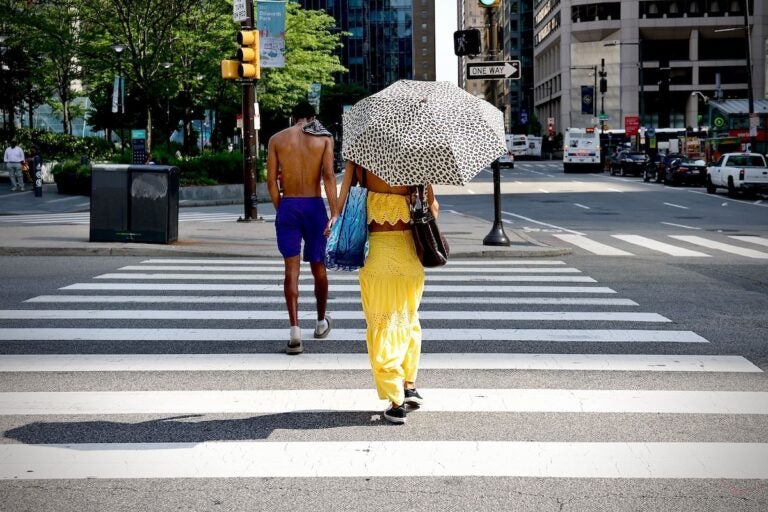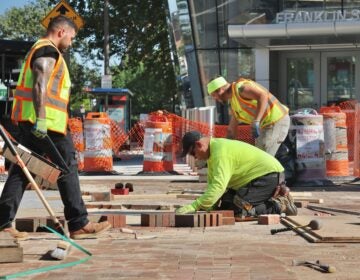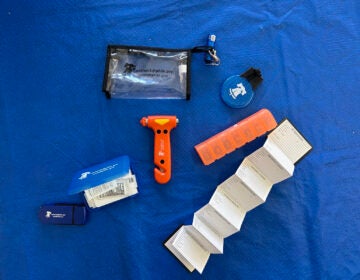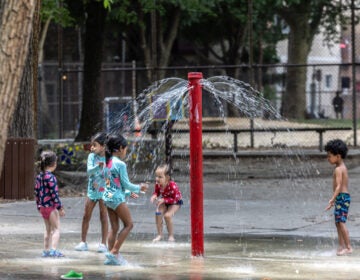Philadelphia region faces record-breaking temperatures
Temperatures in the area could hit 100 degrees Tuesday for the first time since 2012.

A woman uses an umbrella for shade while crossing JFK Boulevard near City Hall. (Emma Lee/WHYY)
This story is part of the WHYY News Climate Desk, bringing you news and solutions for our changing region.
From the Poconos to the Jersey Shore to the mouth of the Delaware Bay, what do you want to know about climate change? What would you like us to cover? Get in touch.
The Philadelphia region is facing an extreme heat warning until Wednesday evening as temperatures soar to the upper 90s and could hit 100 degrees Tuesday afternoon for the first time since 2012.
As humidity rises, it could feel as hot as 100 to 110 degrees over the next few days.
“The heat index, or what it feels like to the body, will be basically in the triple digits over the next few days through Wednesday,” said Michael Gorse, a meteorologist with the National Weather Service in Mount Holly. “So when we get to those ranges, that’s definitely dangerous.”
Temperatures are expected to decrease Thursday with the arrival of a thunderstorm, and relief may come Friday.
“We may warm up again a little on the weekend, but it looks like it’s not going to be until the end of the week when we’ll definitely break the stretch of this dangerous heat,” Gorse said.
Scientists say climate change is driving higher temperatures and longer-lasting heat waves.
The temperatures have also triggered a code orange air quality, meaning it could be unhealthy for vulnerable people, such as those with respiratory problems.
Heat is the top weather-related cause of death in the U.S. Excessive temperatures can impact cardiovascular and respiratory health and reduce sleep.
Extreme heat compromises the body’s mechanism to cool itself, affecting the brain and heart and increasing the risk of seizures, stroke, rapid heartbeat and shortness of breath.
“This week, we’re expecting to see people coming in with signs of heat exhaustion, hopefully not heatstroke, but that’s another complication from heat-related illnesses,” said Dr. Chidinma Nwakanma, an emergency medicine physician at the University of Pennsylvania. “Dehydration, sports-related illnesses or injuries as people are outside more and doing more physical activity.”
Making sure to get his jog in early on Monday morning, Fairmount resident Jerome Smith said he feels good, but he planned to stay inside for the rest of the day.
“I like to come out in the extreme heat to test my abilities. It’s really hot out here — I can tell you that,” Smith said.
He said he normally runs 5 miles a day, but he cut it down to three.
“I was drenched from that, so I called it a day,” Smith said.
Older people and children are more vulnerable to the effects of extreme heat because they’re less able to regulate their body temperature, Nwakanma said.
People can stay cool by wearing light-colored clothing, closing their blinds, taking a cold shower or relocating to the basement. Residents who don’t have adequate air conditioning should seek cooling centers — just a couple of hours of relief can make a significant difference, experts say.
Nwakanma advises people to drink every 30 minutes to an hour, and eat fruits with high water content such as watermelons and oranges. She also recommends applying cool towels on the wrist, neck or groin to reduce body temperatures, including before stepping outside.
While many are keeping cool inside, outdoor workers have no choice and are some of the most vulnerable to the impacts of high temperatures. People who work outdoors should stay hydrated and take more breaks to allow the body to cool down, and when possible, avoid working during the hottest time of day, experts say.
“You feel yourself getting too hot, and you have an opportunity to sit in the truck, get in the air for a few minutes,” said landscaper Tyree Brice, who was out working in the Fairmount section of the city on Monday. “Drink plenty of fluids, water, gatorade, powerade, anything of those that will restore electrolytes.”
People should seek a cool place immediately if they begin to feel nauseous, physicians say.
Leah Schinasi is a professor of environmental and occupational health at the Dornsife School of Public Health at Drexel University. She recommends that cities and states enact laws that protect workers during extreme heat and require landlords to provide air conditioning.
Schinasi also calls on cities to modify surfaces such as sidewalks and roofs from dark colors that absorb heat to lighter colors that reflect heat.
“It’s really important that we have these conversations and we help people to recognize that heat is a hazard and it’s something that we need to take seriously,” she said.
As people stay indoors and crank up the AC, the heatwave has also sent power prices soaring. The region’s power grid operator PJM Interconnection expects to reach levels of demand not seen since 2013. A spokesman for PJM said there will be enough electricity to meet customer demand.

Get daily updates from WHYY News!
WHYY is your source for fact-based, in-depth journalism and information. As a nonprofit organization, we rely on financial support from readers like you. Please give today.






